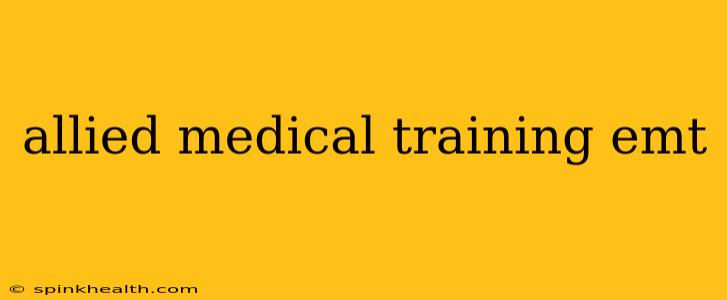The siren wails, the flashing lights pierce the night – the urgency is palpable. For many, the image of an EMT (Emergency Medical Technician) evokes a sense of bravery, skill, and unwavering dedication. But the journey to becoming an EMT isn't just about adrenaline; it's a journey of rigorous training, unwavering commitment, and a profound desire to help others in their most vulnerable moments. Allied Medical Training plays a crucial role in guiding aspiring EMTs through this transformative process. Let's delve into what Allied Medical Training offers and answer some frequently asked questions about this rewarding career path.
What is Allied Medical Training?
Allied Medical Training isn't a single entity, but rather represents the diverse range of educational institutions and programs that offer EMT training. These programs provide the essential knowledge and practical skills needed to become a certified EMT. They encompass a blend of classroom learning, hands-on simulations, and real-world experience (often through clinical rotations). The curriculum covers a vast spectrum, from basic life support (BLS) and trauma care to patient assessment, communication, and ethical considerations. The quality and specifics of these programs can vary, so careful research is key.
How long does EMT training take?
How long is EMT school?
The duration of EMT training programs typically ranges from a few months to a year, depending on the intensity of the program and the prior medical experience of the student. Some programs are offered part-time, allowing students to balance their studies with work or family commitments. However, accelerated programs may condense the learning into a shorter timeframe. The commitment is significant, demanding both time and dedication.
What are the prerequisites for EMT training?
What are the requirements to become an EMT?
Requirements can vary based on the specific program and state regulations. Generally, aspiring EMTs need to be at least 18 years old, possess a high school diploma or GED, and pass a background check. Some programs may require CPR certification prior to enrollment. Physical fitness is also essential, as the job demands physical stamina and the ability to handle stressful situations.
What does EMT training involve?
What do you learn in EMT school?
EMT training is a comprehensive program covering a wide range of skills and knowledge. Expect to learn:
- Basic Life Support (BLS): This forms the foundation, encompassing CPR, airway management, and oxygen administration.
- Trauma Care: Managing injuries, from minor wounds to severe trauma, requires a deep understanding of anatomy and physiology.
- Medical Emergencies: Recognizing and treating various medical conditions, such as heart attacks, strokes, and diabetic emergencies.
- Patient Assessment: Developing a systematic approach to evaluating patients, determining their needs, and making critical decisions.
- Emergency Vehicle Operation: Safe and efficient operation of ambulances and emergency vehicles is crucial.
- Communication and Teamwork: Effective communication with patients, family members, and other medical professionals is paramount.
- Legal and Ethical Considerations: Understanding patient rights, confidentiality, and the legal framework governing EMS.
What are the job prospects for EMTs?
Is EMT a good career?
The demand for EMTs remains strong, driven by an aging population and the increasing need for emergency medical services. While the work can be demanding, both physically and emotionally, it offers a rewarding career path for individuals passionate about helping others.
What is the difference between an EMT and a paramedic?
What is the difference between an EMT and a paramedic?
EMTs provide basic life support, while paramedics offer advanced life support, including administering medications, performing advanced airway procedures, and providing more complex interventions. Paramedics undergo significantly more extensive training.
The path to becoming an EMT through Allied Medical Training or similar programs isn't easy, but the rewards—both personal and professional—are immense. It’s a career that combines intellectual challenge, physical dexterity, and the profound satisfaction of making a real difference in people’s lives. If you possess the dedication, compassion, and willingness to learn, a career as an EMT could be the perfect fit for you.

